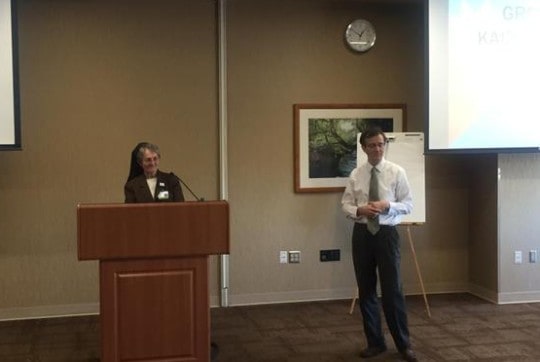
Last Wednesday and Thursday, I collaborated with Joe Swartz and a countless number of his colleagues to host 24 visitors from different health systems (and an Indiana state government organization) to learn about the “Kaizen” approach to continuous improvement first hand at Joe's health system – Franciscan St. Francis Health in Indianapolis.
I tend to “take notes” these days via Twitter and you can read all of my tweets and quotes if you like. Here are a few highlights, incorporating some of these tweets, as appropriate.
Welcome and Greetings
As in the Franciscan tradition, the meeting was started with an invocation from Sister Martha Ann, one of the five nuns who still help run the hospital (and she's a certified Lean Sigma Green Belt).

Appropriately, for the type of improvement work we all do, she invoked the “Serenity Prayer” in her remarks:
O God, give us the serenity to accept what cannot be changed,
The courage to change what can be changed,
and the wisdom to know the one from the other
Hear Mark read this post — subscribe to Lean Blog Audio
CEO Bob Brody
We also had opening remarks from their CEO, Bob Brody:
Yes, the memory and principles of W. Edwards Deming are alive and well. Brody said,
“The first thing to do is drive out fear. It's not people, it's processes that fail.”
He added:
“We're constantly looking for ways to improve our own performance. Improve value & services for our patients. It adds up.”
Perhaps thinking back to Deming's “survival is optional quote,” Brody said:
“Continual improvement is absolutely necessary if we're going to survive.”
CNO Susan McRoberts
Their CNO, Susan McRoberts, gave a longer talk about their Kaizen approach and their journey toward being a culture of continuous improvement.
She said:
“There have been a lot of fads, but Lean Six Sigma is not one of them. It works.”
Why do they do Kaizen?
- Because it saves time
- It's data driven
- It makes life easier
- Because it's short and sweet
- It can be, for the most part, generalized
- Because it changes the culture
This was a key point for the attendees… the idea that the PRACTICE of Kaizen leads to a culture of continuous improvement. One attendee commented that she had, basically, gotten stuck in a trap where they felt like they couldn't try Kaizen because they didn't have the right culture in place. Nobody ever has that culture in place when they start and the attendees learned a powerful lesson (or were reminded of that).
See my past blog post about how the best time to start is today.
Some other comments from McRoberts:
That's an important point… it has to be OK for people to “make mistakes” but that doesn't give us a blank check to act recklessly. Find the right balance…
We have to help staff realize when they are just working around a bad process instead of fixing the cause of the problem.
Listen to Mark read the post (learn more):
You have to help create an environment where people can speak up:
And leaders need to be helpful, not “the boss.”
And, if individuals struggle with Kaizen, that's the responsibility of the leader to help fix that instead of blaming them as being bad people.
As a nurse, McRoberts realize that it's all about the patient and the need to improve their care:
But they do try to add up cost savings when they see it (and they have finance validate large savings):
She finished her comments with praise for Joe Swartz (who is incredibly humble).
Kaizen fits with the hospital's values and, in particular, the Franciscan Values.
The Current State of Kaizen
Before we went on the first of our gemba visits, Joe talked about the current state of Kaizen at Franciscan and what their current challenges are.
They measure the percentage of employees who formally participate in the “quick and easy kaizen” program. Last year it was 38%. Their goal this year is 50% participation and their long-term goal is to have everybody participate.
In the early days of their Lean Sigma approach, they didn't have a robust approach to continuous improvement.
You have to help people see the benefits of Kaizen – what's in it for them and their patients?
When you show real examples of Kaizen improvements (especially small stuff), people say “Oh, I can do that!” and they participate.
That was a key lesson for one attendee, who is going to go back and do a better job of showing people examples of the types of Kaizen improvements they are looking for to get started (little stuff, not million-dollar ideas).
Joe dropped a lot of wisdom on the group, including:
I like to emphasize that everybody struggles with Kaizen at first. That's OK. That's to be expected.
But you need coaching and support, rather than being left to flounder. You need to find ways to make them WANT to participate in Kaizen.
This was a lesson repeated by all managers — the role of managers is not to collect suggestions and do all of the work themselves!
Emergency Department Improvements
Joe talked about improving the emergency department by breaking a big problem up into smaller Kaizens.
And they improved inpatient satisfaction:
The Spread of Kaizen
They have successfully used Kaizen in their three Indianapolis hospitals. But, the larger “Franciscan Alliance” organization has hospitals in other parts of Indiana and the Chicago area.
They've tried to spread these practices, but:
Coming Soon
In future blog posts, I'll share thoughts about the gemba visits to the NICU (where I helped host) and thoughts from the discussions and sessions led by different department directors.
If you'd like to sign up to be notified about a possible workshop, please contact us. Or, read more about the workshops.
Please scroll down (or click) to post a comment. Connect with me on LinkedIn.
Let’s work together to build a culture of continuous improvement and psychological safety. If you're a leader looking to create lasting change—not just projects—I help organizations:
- Engage people at all levels in sustainable improvement
- Shift from fear of mistakes to learning from them
- Apply Lean thinking in practical, people-centered ways
Interested in coaching or a keynote talk? Let’s start a conversation.








![When Was the Last Time a Leader Around You Admitted They Were Wrong? [Poll]](https://www.leanblog.org/wp-content/uploads/2025/07/Lean-Blog-Post-Cover-Image-2025-07-01T212509.843-100x75.jpg)

[…] my first post about the on-site Kaizen learning experience at Franciscan St. Francis Health, an event I came to call “Kaizen Live,” I wrote about some of the initial presentations […]